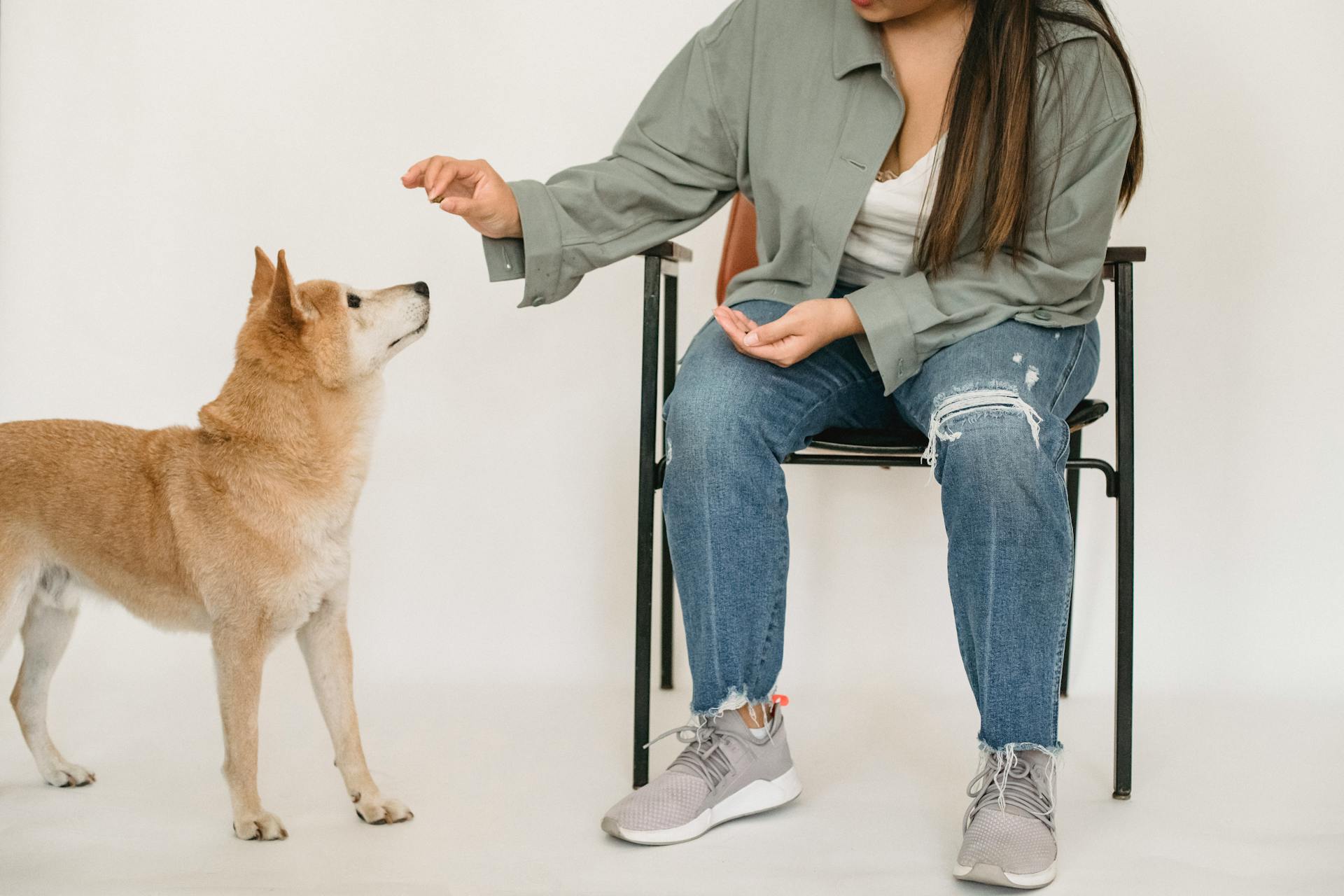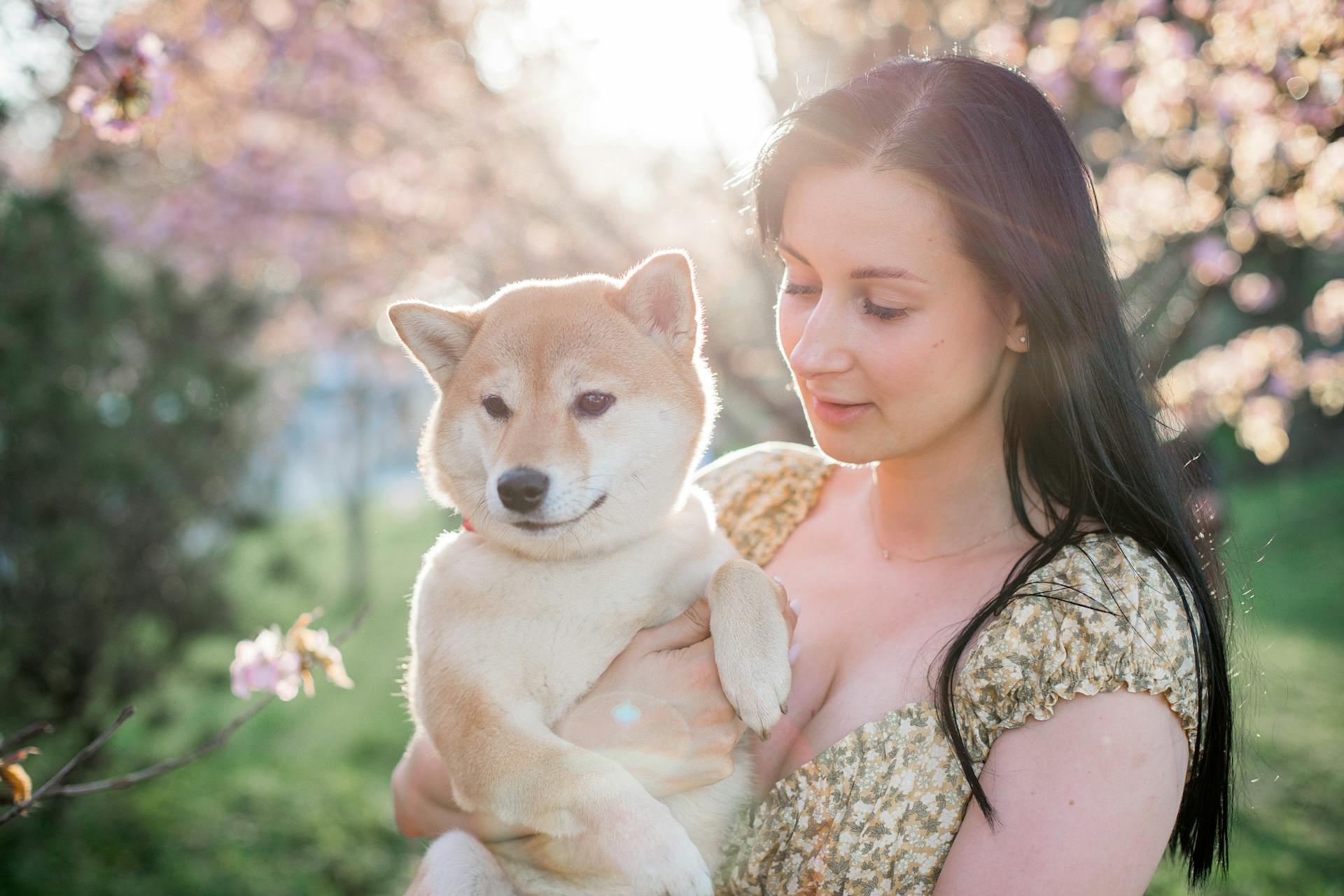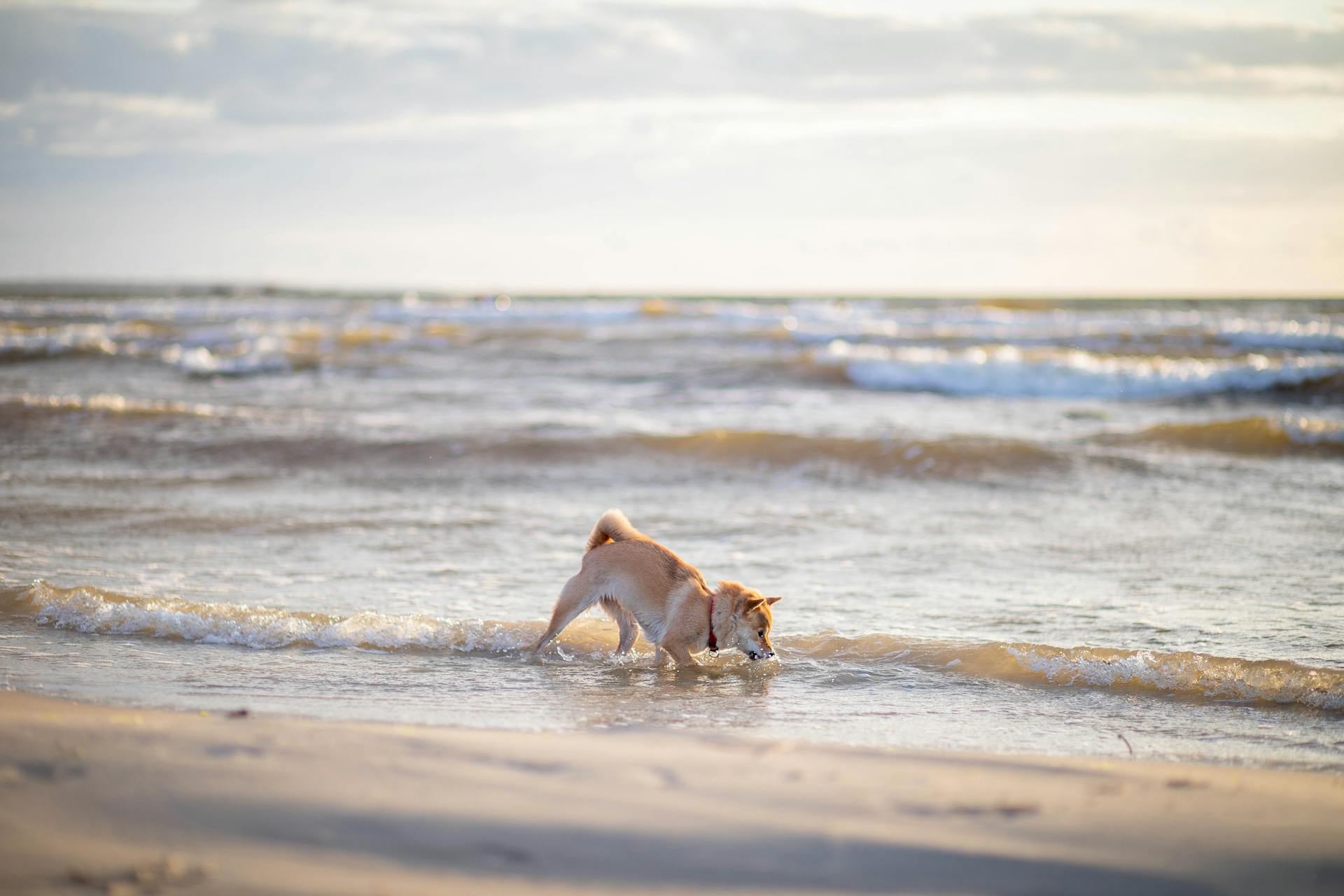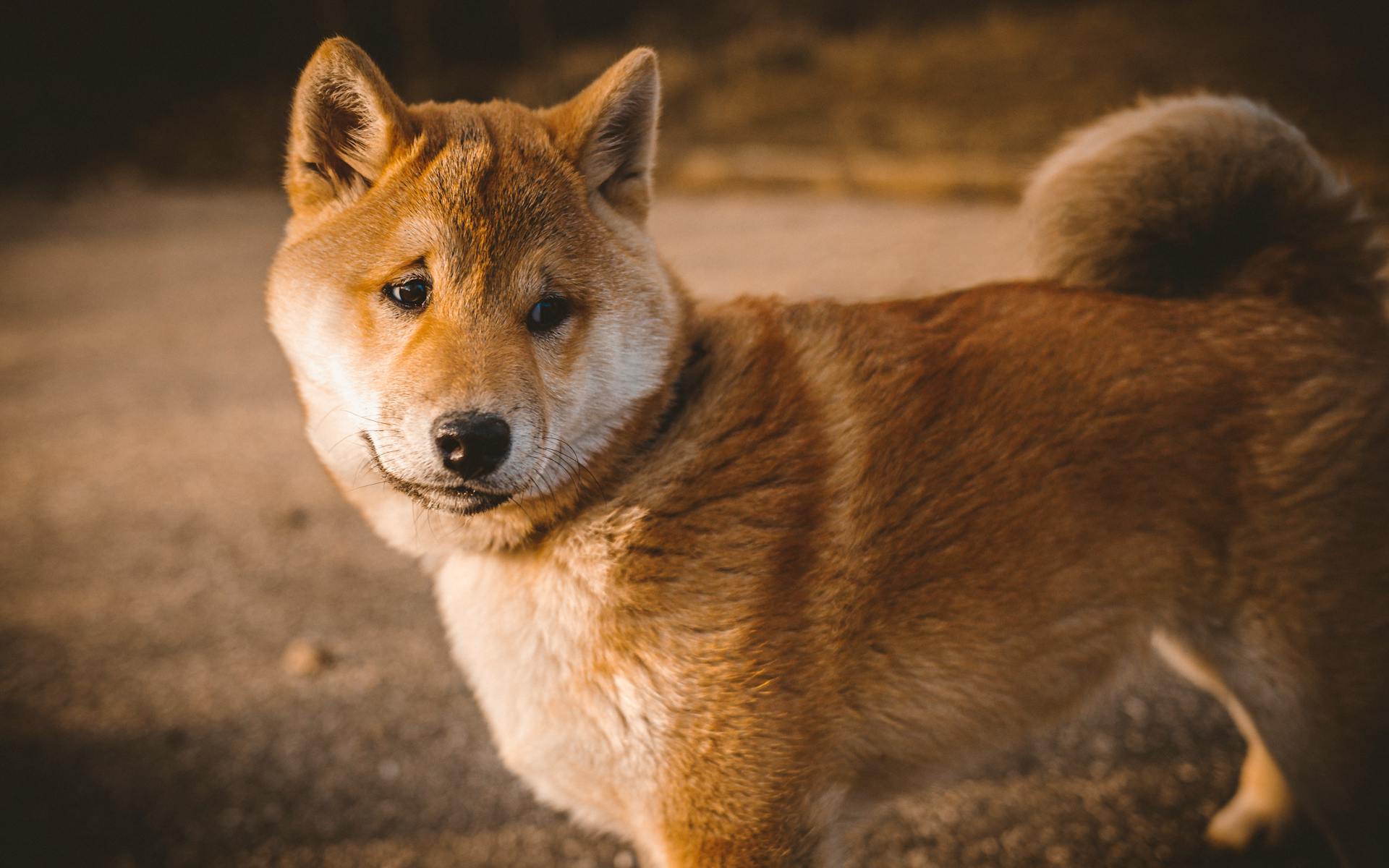
Shiba Inus can be a bit of a handful, but they're also incredibly rewarding to own and care for. They're a relatively small breed, but they have big personalities.
Their independent nature can sometimes make training a challenge, but with patience and consistency, they can learn to obey basic commands. In fact, Shiba Inus are known to be intelligent and responsive to positive reinforcement training.
One thing to keep in mind is that Shiba Inus are naturally wary of strangers, so they may require some time to warm up to new people. This can also make them great watchdogs, as they're naturally protective of their families.
Shiba Inus are generally a healthy breed, but they can be prone to certain health issues, such as hip dysplasia and eye problems. Regular veterinary check-ups and a balanced diet can help prevent or manage these issues.
Check this out: Is Crate Training Good for Dogs
Are Shiba Inus Good Pets?
Shiba Inus can make excellent pets for the right families.
They thrive in households with older, dog-savvy children who can respect their independent nature.
However, they may not be the best fit for families with young children due to their sometimes reserved and aloof demeanor.
Care and Maintenance
Shiba Inus require regular exercise to manage their high energy and alertness, which can lead to anxiety and undesirable behaviors like the "Shiba scream". They need lots of mental stimulation to keep them happy and healthy.
Their double coat sheds a moderate amount, and routine grooming is essential to maintain a healthy coat. This means brushing them regularly and possibly visiting a professional groomer for help during molting periods.
A Shiba Inu's independent disposition means they can be quite vocal, especially if they're feeling stressed or anxious, so it's essential to provide a patient and consistent training environment.
Care Tips
Shiba Inus are high-energy dogs that require lots of mental stimulation and exercise to stay happy and healthy.
To prevent anxiety and undesirable behaviors like the infamous "Shiba scream", make sure to provide your Shiba Inu with regular exercise and mental stimulation.
Their double coat means they shed a lot, so be prepared for regular grooming sessions to keep their coat healthy.

Shiba Inus are bold and fiery, so they do best with experienced pet parents who can provide the patience and consistency needed to train them with positive reinforcement.
Regular grooming will help keep their coat healthy, but be prepared for the extra work that comes with having a Shiba Inu as a pet.
Coat Care
Shiba Inus have a thick double coat that sheds a moderate amount. Routine grooming can help manage the shedding.
Shibas will go through a molting period once or twice a year, where they shed a large amount of their coat. During these times, a professional groomer can help manage the flying fur.
Brushing your Shiba Inu several times a week, especially during shedding season, will help control loose fur and prevent matting. This regular grooming will also help maintain their luxurious double coat's beauty and health.
Diet and Nutrition
An adult Shiba Inu needs to eat around one to one and a half cups of kibble per day, depending on their energy levels and size.

Free feeding should be avoided, as some Shibas will eat anything in sight.
You should be able to feel your Shiba's backbone, hip bones, and ribs but not see them.
A healthy Shiba is neither too thin nor too fat, which means watching your dog's calorie intake and level of activity is crucial.
If you have any questions about the type, quantity, or frequency of feedings for your Shiba, be sure to talk to your veterinarian.
Exercise for Puppies
Shiba Inus are high-energy dogs that require lots of exercise to stay happy and healthy.
Daily walks, hikes, or playtime in a securely fenced yard are essential for their physical and mental well-being. Engaging them in puzzle toys or other mental stimulation activities can help prevent boredom and destructive behaviors.
Shibas are naturally obedient and devoted, but they can be quite stubborn and independent, so they need consistent training and positive reinforcement.
Shiba Inus are easy to housebreak, with many puppies able to last all night without going outside by five weeks old.
Health and Wellness
Shiba Inus are known to be relatively healthy dogs, but like all breeds, they can be prone to certain health issues. Hip dysplasia is a common problem in Shiba Inus, which can lead to arthritis and mobility issues if left untreated.
They also tend to be overweight, which can exacerbate existing health problems and lead to new ones. Regular exercise and a balanced diet are crucial to maintaining a healthy weight.
Shiba Inus are generally long-lived, with an average lifespan of 12-15 years, which is impressive for a small dog breed.
Illness/Health Concerns
Shiba Inus are generally a healthy breed, but they can be prone to certain health issues due to the close-breeding of the gene pool after WWII.
Hip dysplasia is a common problem in Shiba Inus, where the hip joint forms abnormally and can impact their mobility. Regular exercise and maintaining a healthy weight can help mitigate its impact.
Eye problems, including progressive retinal atrophy (PRA), cataracts, and glaucoma, are also a concern.

Allergies like atopy, which commonly affects the skin folds, belly, ears, and feet, can cause discomfort and skin issues. Keeping an eye on any symptoms and getting in touch with a vet as soon as you notice anything out of the ordinary is crucial.
Proactive measures, such as regular veterinary check-ups and genetic screening, can reduce the likelihood of these health concerns. Responsible breeding practices are also essential in reducing the risk of inherited health issues.
Health Expectancy
Shiba Inus generally live for 12 to 15 years, which is a relatively long lifespan for a dog breed.
Their overall health is quite good, with a low maintenance requirement when it comes to major health concerns.
However, some Shiba Inus may be prone to minor issues like allergies and eye problems.
Regular veterinary check-ups can help catch any potential issues early on and ensure a long and happy life for your Shiba Inu companion.
Training and Behavior
Shiba Inus are highly intelligent dogs that can pick up on training cues easily, but they can also be independent-minded and opinionated.
They may not follow your cues or even scream to signal their frustration if they're not interested in what you're asking from them. Taking your time and socializing them to adapt to new sensations and experiences will help them relax and learn.
These dogs are naturally obedient and very devoted, but they may only listen when they feel like it. With some patience, consistency, and positive reinforcement, you should get the desired results.
Shiba Inus are fairly energetic and love walks, so owners should be dedicated to providing regular physical activity. If the dog doesn't have an adequate, safely-fenced yard, this is especially important.
Early training and socialization are a must for Shiba Inus to learn good manners. They should never be off-lead unless in a confined area as they're prone to escaping.
Many Shiba puppies are able to last all night without going outside by five weeks, and can even wait until morning to be taken outside to go to the bathroom. This makes housebreaking relatively easy.
Characteristics and Appearance
The Shiba Inu's physical appearance is quite unique. They have a medium-sized Spitz body with pointy ears and dark eyes.
Their weight is relatively small, ranging from 17 pounds for females to 23 pounds for males. Males typically stand between 14.5 and 16.5 inches tall, while females are slightly shorter, ranging from 13.5 to 15.5 inches.
Shibas are known for their thick, double coat, which comes in several color variations, including cream, black and tan, red, and red sesame. They also have distinctive white markings on their chest, belly, cheeks, legs, and inner ears.
Suggestion: Is Red Meat Good for Dogs
Personality and Temperament
Shiba Inus are high-energy dogs that need mental stimulation to prevent boredom, making puzzles and games a great option to keep them entertained.
They are active and curious, requiring daily "scent walks" to sniff and explore their surroundings.
Shibas can be very lazy and enjoy just spending time with their family, making them great companions.
Typically, Shiba Inus are confident, bold, and good-natured, but they can be slightly stubborn and occasionally affectionate.
Only 67.9% of Shiba Inus passed the American Temperament Test Society's evaluation, indicating that they can be a bit challenging to manage.
Shibas have a reputation for being "cat-like" due to their grooming habits and strong independence.
They are known for dramatics, such as talking, yodeling, screaming, or throwing temper tantrums if they don't get attention or things don't go their way.
Despite their independent nature, Shiba Inus can form strong bonds with their families and exhibit unwavering loyalty.
However, their loyalty doesn't always extend to strangers, as they can be reserved and cautious in unfamiliar situations.
Shibas are generally not aggressive towards humans, but they can be stand-offish and may take time to warm up to new people.
They are instinctively cautious and do not like excessive handling and attention, making them a great fit for single-pet households.
Appearance
The Shiba Inu's appearance is truly one of its standout features. Their compact yet muscular build makes them a captivating sight, and their pointed ears stand erect, expressing alertness and curiosity.
Their distinctive curly tails are a result of their genetics and breed-specific traits. This feature helps to protect the appendage during harsh weather by curling over their back, pressing close to the body for warmth.
Shiba Inus come in a variety of colors, including vibrant red, striking sesame, creamy white, and classic black and tan. Each Shiba's coat is a unique canvas of natural beauty.
The males typically weigh around 23 pounds, while females weigh around 17 pounds. Their height averages between 14.5 and 16.5 inches for males and 13.5 and 15.5 inches for females.
Here are the different colors you can find in a Shiba Inu's coat:
- Cream
- Black and tan
- Red
- Red sesame
Their white color markings on their chest, belly, cheeks, legs, and inner ears add a touch of elegance to their overall appearance.
Pet Parent Considerations
Shiba Inus are intelligent dogs that require mental stimulation to prevent boredom and stress. They enjoy activities that challenge their minds and use all their senses.
Their independent nature can make them seem aloof or stubborn at times, but this is just a part of their unique personality. Shibas are known to be bull-headed, which means they can be quite determined and strong-willed.
Regular exercise is essential for Shiba Inus, as they are quite active and need to burn off energy. They are agile and athletic, making them a joy to watch as they navigate obstacles with ease.
Shibas can be prone to anxiety, which can lead to vocalization, including the infamous "Shiba scream." However, with proper socialization and desensitization, they can thrive in various environments.
Here are some key characteristics to consider when deciding if a Shiba Inu is the right breed for you:
- Aloof but cute: Shibas can be independent and aloof, but they are also irresistibly cute.
- Bull-headed: Shibas are known for their stubbornness, but it's also a sign of their determination and strong will.
- Mouse trapper: Shibas have a strong prey drive and may try to chase small animals like squirrels.
- A+ student: Shibas are highly intelligent and quick learners.
- Guardians of the galaxy: Shibas can be wary of strangers and may take time to trust new people.
By understanding these characteristics and providing the right environment, you can help your Shiba Inu thrive and enjoy a fulfilling relationship with your pet.
Frequently Asked Questions
What is the downside of Shiba Inu?
Shiba Inus can be strong-willed and independent, making training and socialization challenging at times. They also require regular grooming and may vocalize occasionally, requiring dedicated care and attention.
Do Shiba Inus like to cuddle?
Shiba Inus are not typically open to free cuddles and often maintain a distance from unfamiliar faces. While they may have a wild ancestry, their temperament can be a bit independent and aloof.
Are Shiba Inu dogs good with kids?
Shiba Inus can be challenging with children due to their impulsive nature, requiring close supervision to ensure everyone's safety and happiness
Sources
Featured Images: pexels.com


